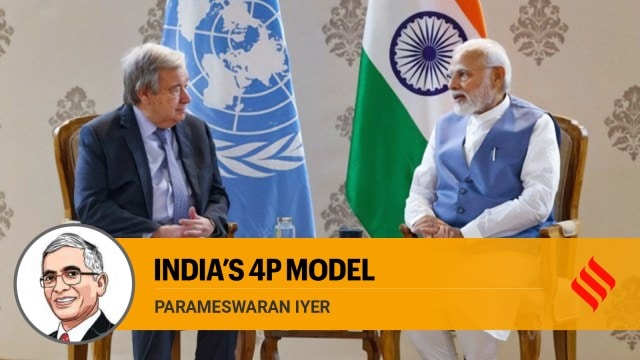
At the World Bank-IMF spring meetings this week in Washington DC, a particular event came to my attention: a ministerial-level consultation to follow up on the 2023 Paris Pact for People and the Planet (4P), which seeks, among other objectives, to ensure that no country should have to choose between fighting poverty and fighting for the planet. I was reminded of an earlier 4P formulation that came out of the Mahatma Gandhi International Sanitation Conference (MGISC) held in Delhi in October 2018. At this event, co-hosted by Prime Minister Narendra Modi and UN Secretary-General Antonio Guterres and attended by Ministers of Health and Sanitation from 55 countries around the world, a different but related set of 4Ps were declared as India’s formula for achieving developmental results on the ground. These were — political leadership, public financing, partnerships and people’s participation.
The 4Ps from the Delhi declaration were key lessons emerging from Prime Minister Modi’s transformational programme, the Swachh Bharat Mission (SBM), which aimed at eliminating open defecation and improving the quality of life for over 550 million Indians, particularly women and girls, through a mass movement or jan andolan of behaviour change, and through the provision of over 100 million toilets. International recognition of India’s substantial contribution to the achievement of Sustainable Development Goal (SDG) number 6 (water and sanitation) led to Prime Minister Modi being awarded the Global Goalkeeper award at New York in September 2019 for the progress India had made in improving sanitation.
For the World Bank, now with the new vision of “a world free of poverty on a livable planet”, it is important to learn from India’s 4Ps since they are directly relevant to the successful implementation of large-scale transformational programmes, whether they are aimed at poverty-alleviation or address global public goods like climate change and pandemics. Let us examine why.
The first P (political leadership) is perhaps the fulcrum of driving change and impact on the ground. It took a leader like PM Modi to boldly announce to the world at his inaugural Independence Day speech on August 15, 2014, that the time had come to squarely tackle the hitherto impossible challenge of open defecation in India – and restore dignity, health and security to communities, especially women and girls. The declaration of the goal to achieve a clean India was followed by the creation of institutional and financing mechanisms to implement this massive programme in a federal context. The PM also closely monitored the progress of the SBM on the ground, including by the use of technology.
The second P (public financing) is a direct follow-up to the first, through a high-level policy decision to finance the implementation of sanitation — a public good — across the country. In a context where scarce public resources had to be deployed for national developmental priorities, it took a discerning leadership to appreciate that investment in sanitation influenced both poverty reduction and led to an improvement in the quality of life for India’s population. As a result, the Indian government, Centre and state, invested as much as $20 billion on sanitation. Many of the Health and Sanitation Ministers at the MGISC had personally told me that they were keen to go back to their countries and initiate SBM-type sanitation programmes (Nigeria, in fact, soon launched the Clean Nigeria programme) but had one request of us. Could PM Modi talk to their presidents and prime ministers and influence them to invest in sanitation like India had?
The third P (partnerships) was also critical. The SBM was never implemented as a sarkari programme but in partnership with international bodies such as the World Bank, Unicef, the Bill and Melinda Gates Foundation, non-governmental organisations, community-based organisations, state and district administrations, local bodies, panchayats, school children across the country, and with the strong support of media and sports stars. Partnerships were key and led to the creation of a national team Swachh Bharat. The one bonus was that we had a communicator-in-chief, the PM himself.
The fourth P (people’s participation) became the hallmark of the SBM, which had captured the imagination of the nation. Each of the six lakh villages in India decided to take it upon itself to become open defecation free. Rural communities took matters into their own hands and engaged in mass movements to encourage all households to build toilets and use them. Women and girls went from being beneficiaries of the programme to leaders in their own right, and many led jan andolans to declare their villages open defecation free. The fourth P was also critical for ensuring the sustainability of the programme — unless communities took matters into their own hands and owned and implemented it, the outcomes would not stick.
The 4 Ps have successfully been applied to other national programmes in India, including LIFE (Lifestyle for the Environment), the Jal Jeevan Mission and many more. Today, as the world is renewing its focus on the achievement of the SDGs, and the World Bank is working with countries to help them address global challenges, including climate change, pandemics, fragility, water and energy access and food security, the relevance of India’s 4Ps, especially the first one – political leadership — as demonstrated by Prime Minister Modi — has never been greater.
The writer is India’s Executive Director to the World Bank and former Secretary, Ministry of Drinking Water and Sanitation and CEO NITI Aayog. Views are personal


